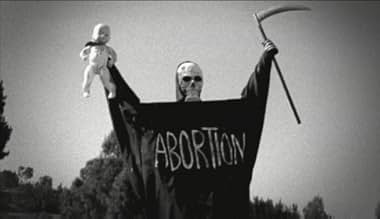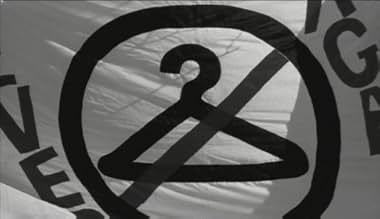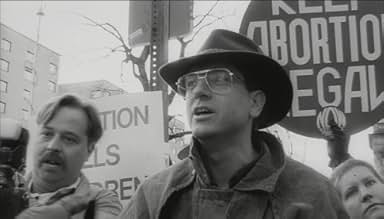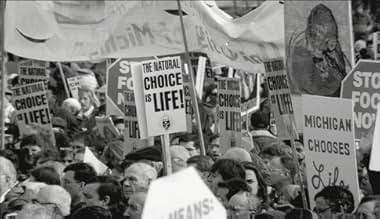PUNTUACIÓN EN IMDb
8,1/10
2,8 mil
TU PUNTUACIÓN
Añade un argumento en tu idiomaA graphic documentary on both sides of the abortion debate.A graphic documentary on both sides of the abortion debate.A graphic documentary on both sides of the abortion debate.
- Premios
- 14 nominaciones en total
John Britton
- Self - Ladies Health Center, Pensacola
- (as Dr. John Britton)
Joycelyn Elders
- Self - Surgeon General, 1993-1994
- (metraje de archivo)
Kevin Fitzpatrick
- Self - Department of Sociology, University of Alabama
- (as Prof. Kevin Fitzpatrick)
Paul Hill
- Self - Convicted of Abortion Related Murder
- (metraje de archivo)
Roger Hunt
- Self - Prime Sponsor, South Dakota Anti-Abortion Bill
- (as Representative Roger Hunt)
Reseñas destacadas
I saw a few people on here proclaiming themselves as pro-life and panning the film for supposedly being biased against their view.
First of all, purely on balance alone I'd say the film is equal to both sides. It's just that most of the stuff which makes you want to be pro-life comes at the beginning of the film while most of the content which makes you want to be pro-choice comes in the second half. It seems to me that they're just upset that their side didn't get the proverbial last word.
Secondly, this film is not about balance anyway. It's about documenting the cultural debate in the film about abortion in America. Whether one or two dissenting reviewers of this film are or not, the fact is that most of the pro-life advocates are Christian religious fringe. Of course there are exceptions, and they document that in the movie. Although I don't think Kaye should have given an hour to the secular atheist pro-lifers, because frankly there aren't that many of them.
The criticism also seem to come from people who don't even understand any points being made in the movie -- one reviewer claimed that Chomsky was comparing abortion to a woman washing her hands. That's not what he was doing at all. His example was made to demonstrate the relativity involved with the process of placing value on life.
In any event, the film definitely is a roller coaster ride, and there are times where you might find yourself at odds with your own opinion. The movie being as balanced as it is, probably wont change a lot of minds, but I would think at the very least it would soften your position one way or another. If it doesn't, you're either just stubborn, or you weren't even trying to pay attention to the message of the film.
First of all, purely on balance alone I'd say the film is equal to both sides. It's just that most of the stuff which makes you want to be pro-life comes at the beginning of the film while most of the content which makes you want to be pro-choice comes in the second half. It seems to me that they're just upset that their side didn't get the proverbial last word.
Secondly, this film is not about balance anyway. It's about documenting the cultural debate in the film about abortion in America. Whether one or two dissenting reviewers of this film are or not, the fact is that most of the pro-life advocates are Christian religious fringe. Of course there are exceptions, and they document that in the movie. Although I don't think Kaye should have given an hour to the secular atheist pro-lifers, because frankly there aren't that many of them.
The criticism also seem to come from people who don't even understand any points being made in the movie -- one reviewer claimed that Chomsky was comparing abortion to a woman washing her hands. That's not what he was doing at all. His example was made to demonstrate the relativity involved with the process of placing value on life.
In any event, the film definitely is a roller coaster ride, and there are times where you might find yourself at odds with your own opinion. The movie being as balanced as it is, probably wont change a lot of minds, but I would think at the very least it would soften your position one way or another. If it doesn't, you're either just stubborn, or you weren't even trying to pay attention to the message of the film.
We've been taught to believe that the purest and best documentaries are those that take a definitive stand on an issue. Such a one-sided approach is supposed to bespeak a righteous passion on the part of a filmmaker - as if dogmatism, in and of itself, were an indisputable virtue. But what if the issue at hand is so morally complex that it simply doesn't lend itself to the strident arguments and easy answers of a black-and-white diatribe? Might it not, then, be best to drop the "know-it-all" posture of the partisan zealot and, instead, attempt to look at both sides of the issue from a position of objectivity and fairness?
Well, that is exactly what filmmaker Tony Kaye has done with "Lake of Fire," a documentary on abortion that attempts to examine both sides of the issue in as unbiased and evenhanded a way as possible. For once, the impassioned spokespersons in both the "pro-life" and "pro-choice" camps are free to have their say and to make their case, without commentary or condemnation from a judgmental third party. In so doing, he has fashioned an unflinching and uncompromising look at one of the issues that most divides Americans today - and will surely do so for a very long time to come..
Watching "Lake of Fire" is a bit like being a ping pong ball in a high-stakes table tennis match. Just as we find ourselves agreeing with a representative from one side of the equation, we are bandied back to the opposing side by what appear to be equally compelling arguments emanating from a spokesperson there. And back and forth we go. For while there are "nutcases" and "screwballs" on both sides of the divide (and they certainly get ample opportunity to voice their views here), many of the people who are interviewed offer sound, reasoned arguments for the positions they take. At a lengthy two hours and thirty-two minutes, Kaye's film has plenty of time to take us into the emotionally-charged world of abortion politics, represented most vividly by the impassioned rallies and protest marches that all too often devolve into name-calling shouting matches that cloud the issue and further alienate those in the political center. Moreover, in what is essentially a new American "civil war," both sides come to the battlefield armed with gruesome images of those who have already perished in the conflict - the pro-lifers of dismembered fetuses, the pro-choicers of murdered doctors and victims of "back alley" abortions.
Kaye is to be particularly commended for not sanitizing or sugarcoating the actual abortion process, clearly assuming that we are grown up enough to face the truth without the need for coyness or comforting filters. Intriguingly, Kaye has opted to film his movie in black-and-white rather than color, a very shrewd and wise decision, since the stark imagery serves to underline the seriousness and gravity of the issue.
If there's a weakness to the film it is that there may be a bit too much emphasis on the movers and shakers in each of the groups and not enough on the ordinary, average citizens whose lives have been directly affected or severely altered by abortion (or the lack thereof). The movie does, however, end on such a note, taking us along with a young woman as she goes through the step-by-step process of an actual abortion. It reminds us that, after all the speeches and marches, all the clinic protests and killing of doctors, the issue finally comes down to an individual woman and the agonizing decision she alone is being called upon to make.
With his film, Kaye clearly wants to make us think, but he doesn't tell us HOW to think - and that's what separates his work from that of so many of his film-making contemporaries. How people will react to this film is anyone's guess. All I know is that, no matter which side of the struggle you may come down on - or even if you have somehow managed to remain scrupulously neutral about it up to this point - "Lake of Fire" will indeed make you think long and hard about the issue.
Well, that is exactly what filmmaker Tony Kaye has done with "Lake of Fire," a documentary on abortion that attempts to examine both sides of the issue in as unbiased and evenhanded a way as possible. For once, the impassioned spokespersons in both the "pro-life" and "pro-choice" camps are free to have their say and to make their case, without commentary or condemnation from a judgmental third party. In so doing, he has fashioned an unflinching and uncompromising look at one of the issues that most divides Americans today - and will surely do so for a very long time to come..
Watching "Lake of Fire" is a bit like being a ping pong ball in a high-stakes table tennis match. Just as we find ourselves agreeing with a representative from one side of the equation, we are bandied back to the opposing side by what appear to be equally compelling arguments emanating from a spokesperson there. And back and forth we go. For while there are "nutcases" and "screwballs" on both sides of the divide (and they certainly get ample opportunity to voice their views here), many of the people who are interviewed offer sound, reasoned arguments for the positions they take. At a lengthy two hours and thirty-two minutes, Kaye's film has plenty of time to take us into the emotionally-charged world of abortion politics, represented most vividly by the impassioned rallies and protest marches that all too often devolve into name-calling shouting matches that cloud the issue and further alienate those in the political center. Moreover, in what is essentially a new American "civil war," both sides come to the battlefield armed with gruesome images of those who have already perished in the conflict - the pro-lifers of dismembered fetuses, the pro-choicers of murdered doctors and victims of "back alley" abortions.
Kaye is to be particularly commended for not sanitizing or sugarcoating the actual abortion process, clearly assuming that we are grown up enough to face the truth without the need for coyness or comforting filters. Intriguingly, Kaye has opted to film his movie in black-and-white rather than color, a very shrewd and wise decision, since the stark imagery serves to underline the seriousness and gravity of the issue.
If there's a weakness to the film it is that there may be a bit too much emphasis on the movers and shakers in each of the groups and not enough on the ordinary, average citizens whose lives have been directly affected or severely altered by abortion (or the lack thereof). The movie does, however, end on such a note, taking us along with a young woman as she goes through the step-by-step process of an actual abortion. It reminds us that, after all the speeches and marches, all the clinic protests and killing of doctors, the issue finally comes down to an individual woman and the agonizing decision she alone is being called upon to make.
With his film, Kaye clearly wants to make us think, but he doesn't tell us HOW to think - and that's what separates his work from that of so many of his film-making contemporaries. How people will react to this film is anyone's guess. All I know is that, no matter which side of the struggle you may come down on - or even if you have somehow managed to remain scrupulously neutral about it up to this point - "Lake of Fire" will indeed make you think long and hard about the issue.
10brumps
The only thing important missing from the film is the impact that overturning Roe v Wade might have on the infertility industry. My husband and I had to resort to in vitro in order to conceive our twin boys. Four fertilized eggs were implanted in me. Fortunately, only two remained viable. But what if all four survived? I would have chosen to "reduce" the embryos. As it was my pregnancy was difficult. I went into pre-term labor at 28 weeks. At 32 weeks they had to induce as my babies were starting to kill me. Imagine if I hadn't had the option to "reduce" and all four implanted. What if the law required me to carry the fetuses until my life was in danger instead of "reducing" early in the pregnancy? Or, what if I had 14 embryos, 4 implanted and 10 frozen? Would the frozen ones then be considered "alive" and therefore could not be discarted? What would be the option then? Would I be prosecuted for 10 counts of murder? So I think the film needed to cover this aspect of the debate. Otherwise it was an exceptional documentary.
when i first heard that Tony Kaye who, let's remember, first made the scene as a self-proclaimed "hype artist" was releasing a documentary about abortion, i was understandably skeptical. turns out my apprehension wasn't necessary. this is a level-headed, even-handed analysis of a difficult and complex subject. regardless of where you might fall on the spectrum of debate, this film will raise questions that deserve reflection. and, needless to say, this is an issue which warrants attention and discussion at the heart of the issue are some of the most fundamental questions about life; surrounding the issue, however, are myriad paradoxes, contradictions, and dilemmas... if the details and gray areas seem unresolvable, how does one contend with the big picture? the speakers assembled represent the range and nuances of the debate well; some of the images are graphic but integral; and for the most part the irrationality and unhinged emotion that often cloud this subject are avoided. i wonder about the use of B&W, both from a theoretical standpoint (the obvious point that this is not a B&W issue, for instance or is that meant ironically? but also the fact that some footage from primary sources had to be manipulated into B&W which might raise some thoughts about documentary technique) and from an artistic standpoint (B&W often providing a feeling of remove between viewer and image, lacking the immediacy of color... although, with this subject, perhaps making use of this sense of remove is a wise choice). this is a film which deserves to be seen which also deserves to be widely shown in schools but will probably never find a large audience. and i'm only speculating here my guess is that most of those audience members will be primarily from one side of the spectrum.
It seems fitting that I watched this on the very day that I read about the atrocious state of child protection in Oklahoma. It is a reminder of the definition of "Pro-Life" that I believe so strongly: they only care about life before it is born, and are not concerned with life after birth.
It was an outstanding documentary that gave both sides of the issue, even to the point of showing an actual abortion being performed. I could have done without that. This is however, the definitive film on the issue.
Some may consider it slanted as it showed the pro-life advocates as crazy loons, but when they are self-confessed bigots like leader Randall Terry, and Klan members/ministers like John Burk that consider murderers "patriots," what else can you call them. This film will give you a good picture of where this issue started, and why it continues to this day. You will learn just who is keeping this alive and their reasons for doing so. You will also be well informed on the types of people who are using this issue for their personal causes.
Great film to educate you on this sensitive issue.
It was an outstanding documentary that gave both sides of the issue, even to the point of showing an actual abortion being performed. I could have done without that. This is however, the definitive film on the issue.
Some may consider it slanted as it showed the pro-life advocates as crazy loons, but when they are self-confessed bigots like leader Randall Terry, and Klan members/ministers like John Burk that consider murderers "patriots," what else can you call them. This film will give you a good picture of where this issue started, and why it continues to this day. You will learn just who is keeping this alive and their reasons for doing so. You will also be well informed on the types of people who are using this issue for their personal causes.
Great film to educate you on this sensitive issue.
¿Sabías que...?
- CuriosidadesIt took 16 years to make this film.
- Citas
Noam Chomsky: You are not going to get the answers from holy texts. You are not going to get the answers from biologists. These are matters of human concern that have to be discussed seriously...
- ConexionesFeatured in WatchMojo: Another Top 10 Controversial Documentary Films (2017)
Selecciones populares
Inicia sesión para calificar y añadir a tu lista para recibir recomendaciones personalizadas
- How long is Lake of Fire?Con tecnología de Alexa
Detalles
Taquilla
- Recaudación en Estados Unidos y Canadá
- 25.317 US$
- Fin de semana de estreno en EE. UU. y Canadá
- 2559 US$
- 7 oct 2007
- Recaudación en todo el mundo
- 25.317 US$
- Duración2 horas 32 minutos
- Color
- Mezcla de sonido
- Relación de aspecto
- 1.85 : 1
Contribuir a esta página
Sugerir un cambio o añadir el contenido que falta

Principal laguna de datos
By what name was Lake of Fire (2006) officially released in India in English?
Responde





















